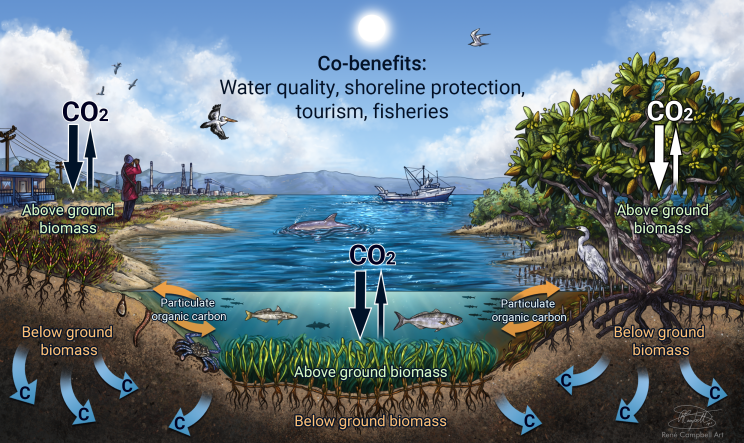MEDIA RELEASE: Carbon storage in costal ecosystems receives new funding
Environment Institute researchers receive new funding to investigate the potential for more carbon storage in our coastal ecosystems.
Leading the way in blue carbon opportunities, our researchers have recently won funding through the new Blue Carbon Futures Grants from the Adelaide and Mount Lofty Ranges Natural Resources Management Board.
Blue carbon is carbon stored in coastal ecosystems, such as in the plants and/or sediments of saltmarshes, mangroves and seagrass beds.
The aim of this funding is to help reduce gas emissions by restoring and protecting Adelaide’s coast environments. If these delicate ecosystems are degraded, they can actually increase emissions by releasing greenhouse gases back into the atmosphere.
–”∞…÷±≤• of Adelaide researchers are leading or participating in three new projects:
1. 'Mapping coastal wetland blue carbon potential in the Adelaide Mount Lofty Ranges (AMLR) Natural Resource Management (NRM) region' -Ã˝lead organisation –”∞…÷±≤• of Adelaide.
This project will generate a map of Blue Carbon Potential) across the AMLR NRM region, providing an assessment of blue carbon stocks and sequestration rates. It will be the first step towards a state-wide map of blue carbon.
Principal Investigator: Dr ,Ã˝Research Associate, Marine Biology, School of Biological Sciences, The –”∞…÷±≤• of Adelaide
2. 'Potential for Zostera seagrass recovery and rehabilitation to enhance blue carbon in South –”∞…÷±≤•' -Ã˝lead organisation –”∞…÷±≤• of Adelaide, with the South –”∞…÷±≤•n Research and Development Institute (SARDI).
The project will assess the extent of carbon accumulation in seagrass meadows and look at how quickly carbon storage changes with natural recovery. As well as underwater video and dive surveys, drones will be used to map intertidal areas to provide a precise baseline for assessing future changes in eelgrass (Zostera).
Principal Investigator: Dr ,Ã˝Affiliate Senior Lecturer, The –”∞…÷±≤• of Adelaide
3. 'A Blue Carbon future through introducing tidal flow to salt ponds and stranded saltmarsh for Dry Creek and the Samphire Coast'Ã˝-Ã˝led by Flinders –”∞…÷±≤• in collaboration with –”∞…÷±≤• of Adelaide.
This project will assess the Blue Carbon futures for Dry Creek and stranded saltmarsh habitats in Gulf St Vincent. Stranded marshes are those that have been cut off from tidal flows by levees or other developments.
Principal Investigator: Prof (Flinders) and Assoc. Prof (UoA) Biogeochemistry, School of Biological Sciences, The –”∞…÷±≤• of Adelaide
Technical reports can be found at .

Image: The carbon cycle in blue carbon ecosystems.
‚ÄúBlue carbon ecosystems make a significant contribution to the global carbon cycle, with organic carbon sequestration rates and storage periods orders of magnitude higher than in many terrestrial ecosystems,‚Äù saysÃ˝, Principal Investigator of the Mapping Coastal Wetland project, and Research Associate in the –”∞…÷±≤• of Adelaide‚Äôs School of Biological Sciences.
‚ÄúThis makes them of significant interest for national and regional climate change mitigation strategies together with ongoing, high rates of global blue carbon ecosystem loss. Degradation and loss of blue carbon ecosystems decreases the carbon storage capacity of the coastal carbon sink and results in CO2Ã˝emissions, while their conservation, restoration and creation have the potential to increase carbon capture and storage, mitigate climate change, support carbon finance opportunities and provide numerous other ecosystem services.‚Äù
–”∞…÷±≤• of Adelaide researchers involved in the research, all from the School of Biological Sciences include:
- Marine Biology: Dr Ã˝≤π≤‘ªÂÃ˝± ∞˘¥«¥⁄±≤ı≤ı¥«∞˘
- Biogeochemisty: Associate Professor
- Unmanned Research Aircraft Facility: Dr Ramesh Raja Segaran
- Spatial Ecology: Dr
- The projects have received co-funding from the , , the and the .
Original media release from the Newsroom.
Image: The role of South –”∞…÷±≤•‚Äôs blue carbon ecosystems in mitigating climate change.
Infographics: byÃ˝Animate Your Science @ and Rene Campbell @
First blog image: Hannah Auricht and Dr Tan Dang, taken by Dr Luke Mosely

Newsletter & social media
Join us for a sensational mix of news, events and research at the Environment Institute. Find out aboutÃ˝new initiatives andÃ˝share with your friends what's happening.
Ã˝Ã˝Ã˝
